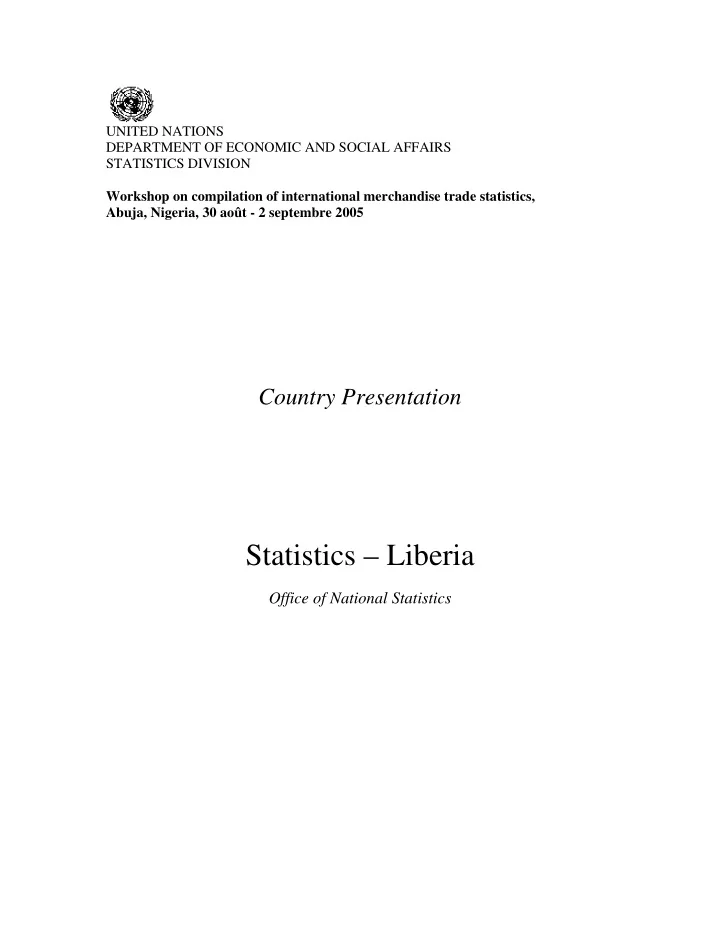

UNITED NATIONS DEPARTMENT OF ECONOMIC AND SOCIAL AFFAIRS STATISTICS DIVISION Workshop on compilation of international merchandise trade statistics, Abuja, Nigeria, 30 août - 2 septembre 2005 Country Presentation Statistics – Liberia Office of National Statistics
The compilation of External Trade Statistics in Liberia ONS
The compilation of External Trade Statistics in Liberia The mandate of the statistical office with respect to external trade statistics is to collect, sort, code/transcribe in accordance with internationally accepted trade classification, information extracted mainly from customs declaration and other sources for final official dissemination and public consumption. Prior to the advent of the civil crisis paper declarations were being used for processing. It is unfortunate to note that since 1998 the processing of external trade statistics is at a standstill. In fact the compilation was based on the Standard International Trade Classification (SITC) Rev.2. All attempt to revert to the Harmonized Commodity Description and Coding System proved futile due to lack of funding to prepare the relevant manual and conduct a workshop involving personnel from customs administration. Liberia Petroleum Refinery Corporation, Forestry Development Authority, Lands, Mines and Energy, Commerce and Customs brokers. Any assistance to facilitate said workshop will be highly appreciated as it could undoubtedly enhance the reactivation of the processing of external trade in Liberia. The statistical office receives a copy of each type of customs declarations duly processed. To ensure an effective coordination, a statistical officer is assigned at the Free Port of Monrovia as Liaison. He makes sure that all missing entries are accounted for by following closely the sequence of serial numbers of each type of declaration. However, the arrangement with customs when declarations seem to have errors is very difficult. Usually, the importer/exporter is contracted to ascertain credibility. Besides customs other sources are used in the compilation of external trade. These include the Liberia Petroleum Refinery Company –for petroleum products, Lands, Mines and Energy-for diamonds, gold, etc., the Forestry Development Authority-for timber, logs, etc., The Liberia Produce Marketing Corporation-for cocoa, coffee, palm kernel, etc., The Firestone Plantations Company and other rubber companies-for rubber, the iron ore companies and Commerce and Industry Ministry. These agencies supply credible information on monthly basis for inclusion. The system of trade in Liberia is the Special Trade, which is based on the concept of clearance through customs. Although the special system is used, information leading to the General Trade System is always reserved but not published. Meanwhile customs procedures excluded from statistics include the following:- (a) Goods assigned by a government to its armed forces and diplomatic missions abroad (b) Temporary trade-goods sometimes imported or exported with the reasonable expectation of subsequent re-export or re-import within a limited time. (c) Vehicles engaged solely in charge of goods or passengers between countries (d) Transshipment (e) Arms brought in by government (f) Monetary gold (except for countries mining gold)
We do not receive data from the Free Zone or processing Zones other that not raw materials coming into the country or transformed goods being exported at which time declarations are prepared. The time schedule of processing declarations is irregular due to lack of transport facilities. In view of this, the time factor for entries is between three to four weeks of the next month. The official publication of merchandise trade statistics is done without consultations with customs and other agencies. As stated earlier on the processing of external trade, I am pleased to present import and export statistics covering the last five (5) years compiled by BIVAC International. Remember these figures do not include the value of rice petroleum products. Value of Liberian Imports and Exports By Year Year Imports Exports 2000-------------- 95,097,363 59,988,369 2001--------------- 72,062,577 63,083,856 2002--------------- 68,679,932 67,967,762 2003--------------- 66,793,795 53,858,459 2004--------------- 141,510,345 21,854,662 Source: BIVAC International Our major export commodities include the following: (a) Cocoa (b) Coffee (c) Logs (d) Diamonds (e) Rubber (f) Iron Ore Our major import commodities include the following: (a) Rice (b) Beverages and Tobacco (c) Petroleum Products (d) Machinery and transport equipments (e) Medicinal and pharmaceutical products (f) Clothing
Recommend
More recommend